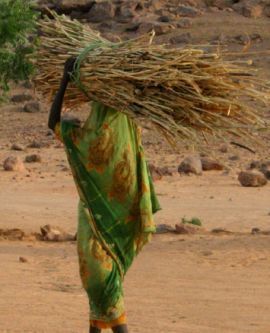Threat of rape still stalks Darfur refugees in Chad, say physicians
May 30, 2009 (WASHINGTON) – Women in eastern Chad who years ago fled the conflict in Darfur continue to face sexual violence, post-traumatic stress and other hardships, says a new report based on a field visit conducted in November 2008 by four female researchers including three physicians.

“The issues around violence are really ongoing and palpable,” said Dr. Lin Piwowarczyk, co-investigator of the report.
Rapes, which occurred in Darfur with such horror and extent as to bring an arrest warrant down on Sudanese President Omer Al-Bashir, are seldom prosecuted or even disclosed. Bashir denies that rape occurred on a mass level in Darfur, saying in an interview with British Channel 4 News in October 2008, “When it comes to mass rape, there is no document or evidence, just accusations. Anything which claims these things are documented is untrue.”
But Physicians for Human Rights, in partnership with the Harvard Humanitarian Initiative, asserts in its report that Darfuri women not only suffered instances of rape during attacks on their villages, but have continued to face violence in Chad.
Most rapes reportedly occur when women venture outside of the camps to gather firewood.
In an interview, Dr. Lin Piwowarczyk said, “All of the women that we interviewed really are suffering. They’re suffering from the memories of their experiences in Darfur, and as they fled Darfur, and also ongoing issues in the camps where they’re living, related to intimidation, sexual violence when going out for firewood, or physical assault, issues related to food insecurity, concerns for their children, lack of education and educational opportunities.”
The study, based on a non-probability sample of 88 women in Farchana camp, combines quantitative and qualitative analysis. Researchers acknowledge that the findings of their study cannot be generalized to the entire population of Farchana nor to Darfuri women in other refugee camps.
Piwowarczyk, a psychiatrist who co-founded the Boston Center for Refugee Health and Human Rights, was part of the four-member team of Americans to interview women living in Farchana camp, determining that 32 of the 88 women interviewed had suffered instances of confirmed or highly probable rape.
Of the women who participated in the study, there were 17 cases of confirmed or highly probable rape that occurred in Darfur and 15 that occurred in Chad. Two women were each raped twice, once in Chad and once in Darfur, and a third was raped twice in Chad, bringing the number of instances to 20.
Seven of the nine cases that occurred in Darfur were gang rapes; the women typically described these attackers as “fair-skinned and wearing green or khaki uniforms with head wraps,” according to the report.
Calling the paper “a rare scientific study,” Susannah Sirkin, deputy director of Physicians for Human Rights, pointed out that investigators conducted 21 physical and psychological evaluations based on a medical assessment known as the Istanbul Protocol, which is used to document cases of alleged torture or other violence.
Sirkin, who contributed to the report, said that many of the women “live in a nightmare of memories of past trauma compounded by the constant threat of sexual violence around the camps now.”
“When people talk about post-traumatic stress disorder, they’re talking about something really after these things happen, whereas in reality there are ongoing traumatic stresses that the women that we interviewed and women at the camp are exposed to each day,” commented Piwowarczyk.
According to Sirkin, there is little psycho-social support for the “prolonged and unimaginable traumas” of victims of rape. She said that the Darfuri women “remain trapped in places of perpetual insecurity”
Almost all of the women interviewed, or 79 out of 88, were from the Masalit ethnic group. The total camp population in the region numbers over 400,000 people who have fled from Darfur or violence within Chad that that has spilled across the border.
One camp resident said “If I could leave, I would leave in this moment,” reported Piwowarczyk, emphasizing that the best long-term response to their suffering is to allow them to return home.
The conflict in Darfur erupted in 2003. In the last month, rebel forces in Sudan launched an offensive into Chad and rebel forces in Sudan launched an offensive into Chad. A European protection force pulled out of the region this year, replaced by an UN-mandated force.
(ST)
The report, titled “Nowhere To Turn: Failure To Protect, Support and Assure Justice for Darfuri Women,” is available at this link: http://darfuriwomen.org/.
